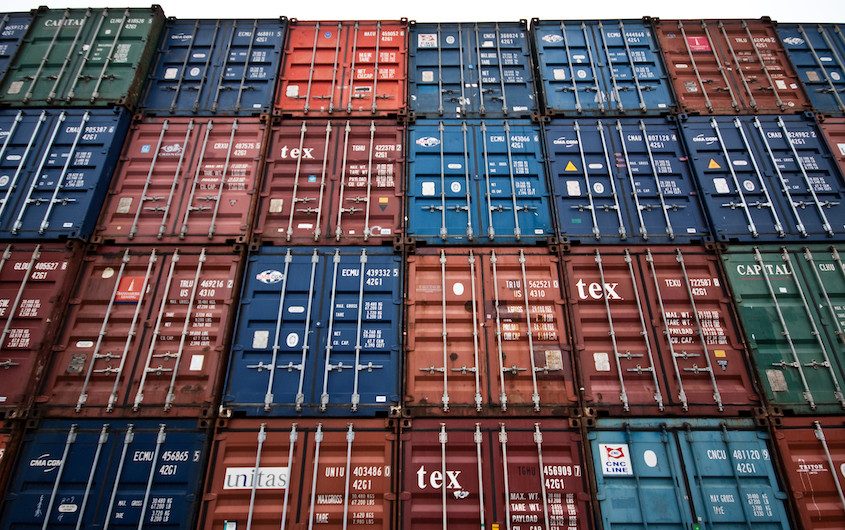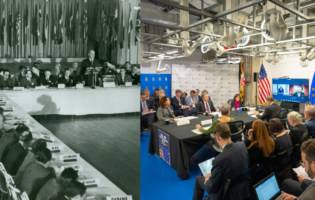
Håkan Dahlström via Flickr
Despite Challenges, the U.S. And EU Can Save the Rules-Based Economic Order and Redefine Globalization

Yixiang Xu
China Fellow; Program Officer, Geoeconomics
Yixiang Xu is the China Fellow and Program Officer, Geoeconomics at AGI, leading the Institute’s work on U.S. and German relations with China. He has written extensively on Sino-EU and Sino-German relations, transatlantic cooperation on China policy, Sino-U.S. great power competition, China's Belt-and-Road Initiative and its implications for Germany and the U.S., Chinese engagement in Central and Eastern Europe, foreign investment screening, EU and U.S. strategies for global infrastructure investment, 5G supply chain and infrastructure security, and the future of Artificial Intelligence. His written contributions have been published by institutes including The Chinese Academy of Social Sciences, The United States Institute of Peace, and The Asia Society's Center for U.S.-China Relations. He has spoken on China's role in transatlantic relations at various seminars and international conferences in China, Germany, and the U.S.
Mr. Xu received his MA in International Political Economy from The Josef Korbel School of International Studies at The University of Denver and his BA in Linguistics and Classics from The University of Pittsburgh. He is an alumnus of the Bucerius Summer School on Global Governance, the Global Bridges European-American Young Leaders Conference, and the Brussels Forum's Young Professionals Summit. Mr. Xu also studied in China, Germany, Israel, Italy, and the UK and speaks Mandarin Chinese, German, and Russian.
__
First there was a trickle. After years of sounding the alarm about China’s use of forced labor, economic coercion, and unfair trade practices, the U.S. government has made steady but slow progress in persuading reluctant allies to share its vision of the future, one in which government policy seeks to balance the benefit of economic efficiency through globalization with the risk of asymmetric dependence and geopolitical competition. A succession of new forums for cooperation between like-minded democracies, among them the U.S.-EU-Japan Trilateral Partnership and the U.S.-EU Trade and Technology Council (TTC), were set up to deliberate over the contours of a revised economic order that both promotes shared democratic values in the face of systemic rivalry with China and accommodates common policy priorities ranging from national security to climate.
Then came the torrent. Following Russia’s invasion of Ukraine, unprecedented Western economic sanctions against Russia and the ensuing global economic disruptions sent allies scrambling to secure energy supplies and contain rising inflation. China refused to condemn Russian aggressions in Ukraine and Beijing pledged to not only strengthen economic and trade cooperation with Russia but also promote alternative international trade settlement mechanisms in order to circumvent Western sanctions. Just this month, the People’s Liberation Army (PLA) conducted the largest-ever military exercises encircling Taiwan, risking an escalation that could severely damage global semiconductor and electronics supply chains. These crises further exposed the vulnerabilities of Western dependence on the globalized economy of the past decades and cemented a consensus among the democratic allies: something needs to be done to provide a degree of insulation as well as predictability for their economies faced with geopolitical risks in turbulent times.
But a consensus around what precisely is necessary or beneficial is not quite clear. Even as Biden administration officials criticize decades of neoliberal economic policy and corporate embrace of globalization for narrowing economic values and exacerbating the fragility of global supply chains, U.S. allies in Europe and elsewhere are reluctant to disavow conventional economic wisdom about the benefits of globalization and free-market competition. German chancellor Olaf Scholz whose country’s export-oriented economy thrived from a comprehensive integration into the global economy even warned against “deglobalization” as a “dangerous aberration.” Call it misreading the signals from the other side of the Atlantic, but European leaders have learned to be skeptical about the United States’ commitment to the liberal trading system after a series of attacks by Donald Trump’s administration, notably blocking WTO appellate body appointments and imposing tariffs on steel and aluminum from the EU. The rise of industrial policy and domestic policy priorities have created a sense of heightened competition, even between like-minded allies.
The picture is even muddier when it comes to economic ties with China. Negative views about China are growing across Europe, and Brussels has tightened the screws on Chinese FDI and pushed back against economic coercion from Beijing. But the EU’s close trade and investment relations with China still exert strong dissuasion within the block against the kind of disentanglement of supply chains on the grounds of national security or human rights seen in the United States. Neither Beijing’s export embargo-cum-informal secondary sanctions against Lithuania nor China’s silence over Putin’s brazen war in Ukraine led to a watershed moment in EU-China relations. German investment in China for the first six months of 2022 reached a new record even as Olaf Scholz has called on German companies to diversify their supply chains and export markets. And paradoxically, as Europe struggles to wrestle itself out of energy dependence on Russia, it is partially turning to resold liquefied natural gas from China, whose purchase of Russian natural gas in the first half of the year nearly tripled from a year ago.
Neither is it clear how the parallel triads of revamped China policy in the United States and the EU (“competitive when it should be, collaborative when it can be, and adversarial when it must be” for the Biden administration and “China as a partner for cooperation and negotiation, an economic competitor, and a systemic rival” according to the EU.) help to attract more global partners to their shared cause to reform and enforce the global economic order. While the United States and its allies view China as a rival that undermines the rules-based international order, much of the rest of the world regards China as a valuable economic partner and a geopolitical alternative to the value-driven policy of Western liberal democracies.
At the same time, the Biden administration’s call for a “worker-centric” trade policy for Americans and its apparent lack of appetite for new trade agreements both damper the appeal and muddle the message of Washington’s new economic partnership initiatives such as the Indo-Pacific Economic Framework (IPEF). In other words, why should countries–especially developing countries–join efforts to counter China’s economic statecraft without the benefit of access to Western markets, especially since many of them see more immediate gains through trade expansion with China by joining Beijing’s initiatives like the Regional Comprehensive Economic Partnership (RCEP)?
Similarly, if the G7’s Partnership for Global Infrastructure and Investment (PGII) or the EU’s Global Gateway strategy—Western alternatives to China’s large-scale Belt-and-Road infrastructure investment initiative—are indeed able to deliver enough infrastructure projects with high standards, transparent financing, and competitive costs, recipient countries would still need an attractive vision about long-term and systemic economic benefits for picking Western partners over China. Afterall, Beijing has offered bilateral and regional trade expansion through Chinese-funded and Chinese-built infrastructure investment, promising the opportunity to ascend global value chain through more economic exchanges. Allegations of Beijing’s debt-trap diplomacy, warnings about China-enabled technology authoritarianism, and accusations of China’s unfair trade practices will not be enough without a strong counteroffer that’s rooted in openness and fairness, the kind of offer that decades ago helped some of today’s staunchest defenders of the liberal international economic order to develop and prosper.
That is also why a well-intentioned push for rules and standards needs extensive consultations and strong buy-ins from a wide range of global partners. But that may be harder to achieve with governments increasingly using trade policy to promote foreign and security policy goals and industrial policy back in vogue: a rules-based economic order can be challenged both by international bloc politics and by overburdening trade policy with a domestic economic agenda. The idea of “friendshoring,” for instance, should not result in subjecting trading partners to an ideological or political purity test. Many of them are not Western-style liberal democracies and regard continuing trade, investment, and technology exchanges with China on their own terms as an established, dependable element of their economic existence. In other words, it is in the interest of the United States, the EU, and their liberal democratic allies to reconfigure global supply chains for vital and critical goods and services in a way that accounts for the economic dynamics and preferences of other partners.
Nor should friendshoring foster divisions between allies on the basis of discrepant capacities or differing domestic preferences. As an example, the United States needs to balance moving fast to establish technologies partnerships on 6G and semiconductors with partners such as Japan and South Korea and pursuing long-term cooperation on both technology innovation and regulatory standards setting with the EU. The TTC holds great promise for guarding against the drift toward competitive industrial policies and shaping a more effective set of rules and tools that would underpin a changing global economic order facing intensifying geostrategic competitions. The transatlantic partners need to put more efforts behind the TTC to produce consequential results and there also need to be new consultation and cooperation mechanisms (along the lines of the TTC) with various groupings of international partners and tailored for specific purposes.
The most potent action to promote and uphold a rules-based global economic order is to insist on its openness and fairness. Public faith in globalization may have wavered in the last decades, but the underlying allure of increased economic efficiency and prosperity persists. The best way to keep delivering those benefits in a time of diligent pursuit of national security, climate protection, and domestic priorities is by creating high-quality standards, fair rules, and enforceable tools that provide stability and maintain access for participants in the global economy.








